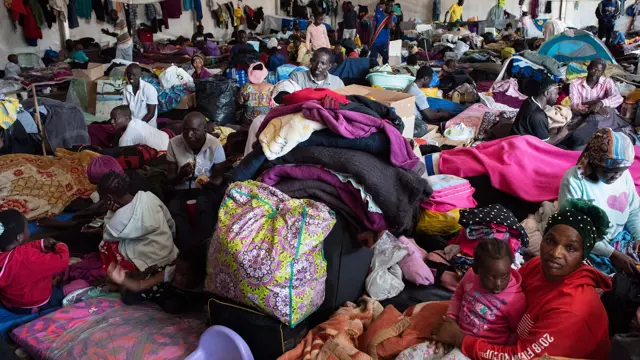On World Refugee day, refugee lobby groups in South Africa have renewed calls for the government to urgently address the ongoing challenges faced by migrants and asylum seekers, particularly around the issuance of legal documentation.
The Consortium for Refugees and Migrants in South Africa (CoRMSA), one of the country’s leading refugee lobby groups, expressed concern that thousands and asylum seekers still struggle to access basic services due to delays and inefficiencies in South Africa’s immigration system. At the heart of their concerns is the inability to obtain or renew critical documents such as asylum seeker permits and status papers.
Speaking on behalf of CoRMSA, executive director Thifulufheli Sinthumule emphasized the severe impact of bureaucratic challenges on displaced people who are trying to rebuild their lives in South Africa.
“On this World Refugee Day, we are reminded of the strength and resilience of people who have fled persecution, conflict, and violence in their home countries,” Sinthumule said. “However, in the South African context, many asylum seekers and refugees still face serious difficulties in accessing essential documents like permits. This prevents them from fully integrating into society and accessing vital services, including healthcare, education, and employment.”
The failure to issue proper documentation on time not only leads to legal uncertainty, but also exposes to exploitation, discrimination, and potential deportation, despite their protected status under international and domestic law.
Refugee Lobby Groups Raise Broader Concerns
Refugee lobby groups like CoRMSA argue that the documentation issue is just one part of a larger systemic problem within the Department of Home Affairs. Inconsistent policies, administrative backlogs, and alleged corruption have left many refugees stuck in legal limbo for years. Some migrants have been forced to travel long distances repeatedly to visit Home Affairs offices, only to face non-functional systems or be turned away due to a lack of capacity.
In some cases, asylum seekers have been waiting for over a decade to receive a final decision on their status application, a delay that has a devastating impact on their ability to settle, work legally, and contribute to the economy.
World Refugee Day, observed globally on June 20, is a day to honor the courage, resilience, and determination of refugees around the world. In South Africa, it also serves as an important platform for refugee lobby groups to engage with government and civil society on improving protection and upholding human rights.
This year, CoRMSA is using the occasion to call for reforms in the reception system, better oversight of Home Affairs, and a more humane approach to managing migration.
“South Africa has a proud history of hosting, and our legal framework is among the most progressive in Africa. But what we see in practice does not reflect that,” Sinthumule added. “What is needed is political will and a commitment to treating and migrants with dignity.”
South Africa is home to tens of thousands of refugees and asylum seekers from countries such as Zimbabwe, Somalia, Democratic Republic of Congo, Burundi, and Ethiopia. While the Constitution and Refugees Act provide a legal framework for protection, implementation has often fallen short.
Refugees report being harassed by law enforcement, denied access to public services, and sometimes even detained despite having legal documents. The stigma and xenophobia experienced by migrants further compound the challenges they face daily.
The Department of Home Affairs has yet to issue a formal response to CoRMSA’s World Day appeal. In recent years, the department has blamed resource constraints, outdated systems, and an overwhelming number of asylum claims for the ongoing backlog in documentation.
However, lobby groups insist that more can and should be done to modernize the refugee protection system, streamline application processes, and ensure that asylum seekers can live with security and dignity.
As communities and their advocates mark World Refugee Day across South Africa, the message is clear: honoring requires more than symbolic gestures — it requires action. lobby groups are calling on both government officials and the public to support measures that will improve the lives of displaced people and uphold South Africa’s legal and moral obligations.
“Refugees are not criminals. They are people who have survived unimaginable hardship. We should be working to protect them, not abandon them in bureaucratic chaos,” Sinthumule concluded.
For now, thousands in South Africa remain in limbo, waiting not just for papers, but for the recognition and dignity they deserve.
Source- EWN

